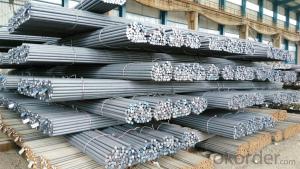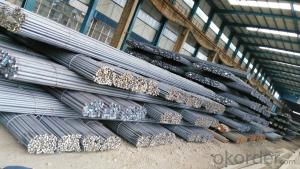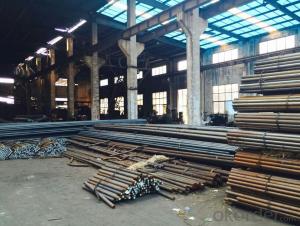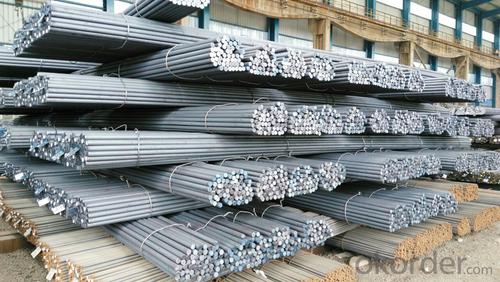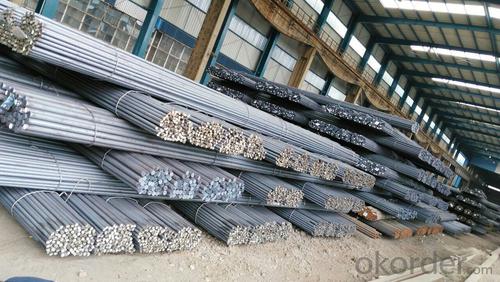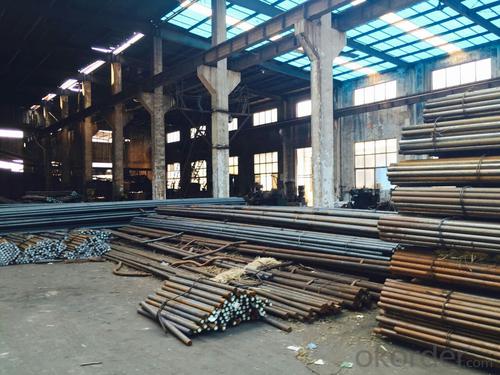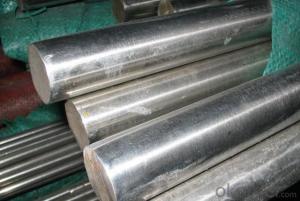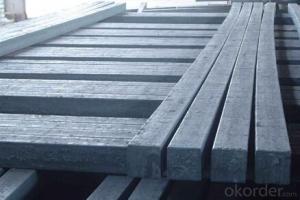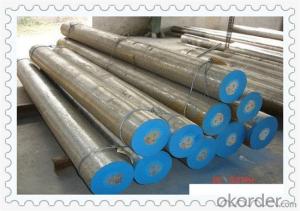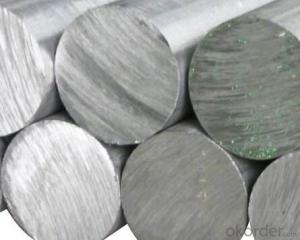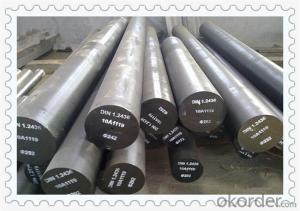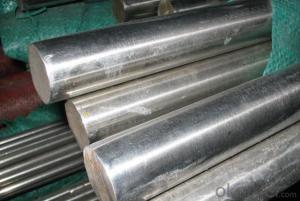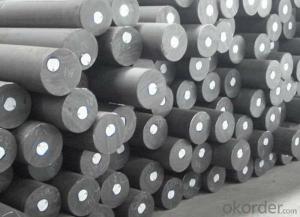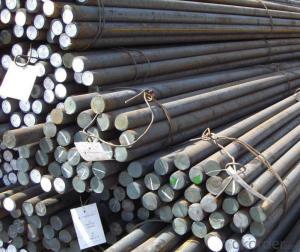Round Bar C60 Carbon Steel 16-300mm
- Loading Port:
- Tianjin
- Payment Terms:
- TT OR LC
- Min Order Qty:
- 25 m.t.
- Supply Capability:
- 50000 m.t./month
OKorder Service Pledge
OKorder Financial Service
You Might Also Like
Specification
Round Bar C60 Carbon Steel 16-300mm
Product details:
Name:Round bar aisi 1060 carbon steel
Place of Origin:Liaoning,China Brand Name:Dongbei Tegang
Shape:round bar Material: Alloy Structural Steel
Steel Grade: AISI 1060/JIS S58C/DIN C60/GB 60
Size:Diameter:10mm~1000mm
Application:used in making high strengthened and wear resistant parts that works under high pressure, like axle, spring ring, axletree, cam, and steel sling etc.
Chemical Composition:
C | Si | Mn | Cr | Ni | Cu | P | S |
0.57-0.65 | 0.17-0.37 | 0.50-0.80 | ≤0.25 | ≤0.30 | ≤0.35 | ≤0.035 | ≤0.035 |
Characteristics:
- High hardness, strength and toughness.
- Poor plasticity during cold deformation.
- Medium machinability.
- Poor weldability.
- Poor hardenability.
- Cracks is often caused during water quenching process.
- Large parts should be in normalizing treatment.
Application:
S60C structural carbon steel bar /1060 /60/C60 can be used to be manufactured roller, shaft, tyre, spring ring, damping spring, clutch and steel wire rope, etc.
Product Show:
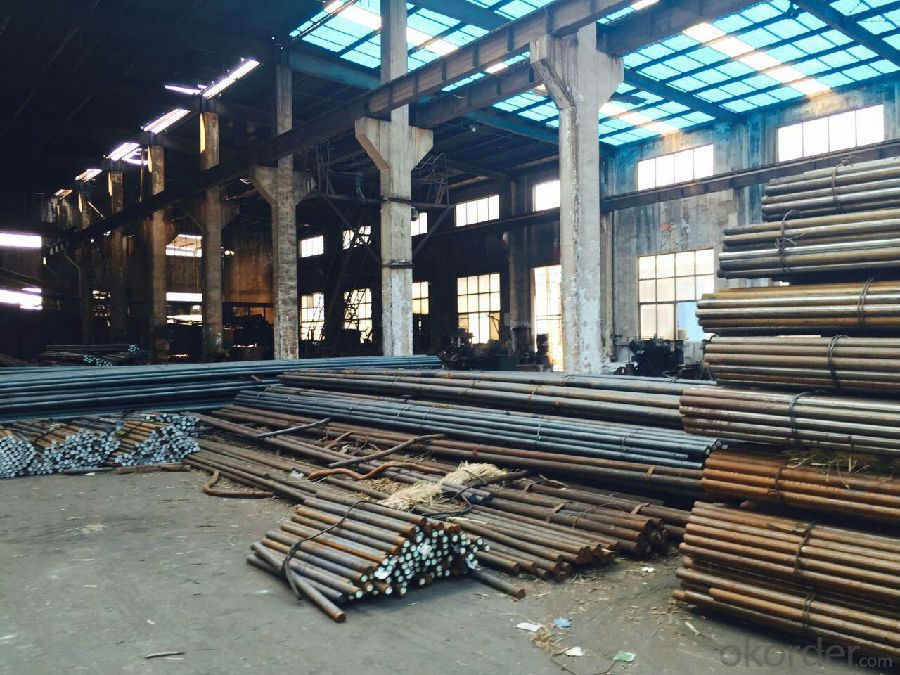
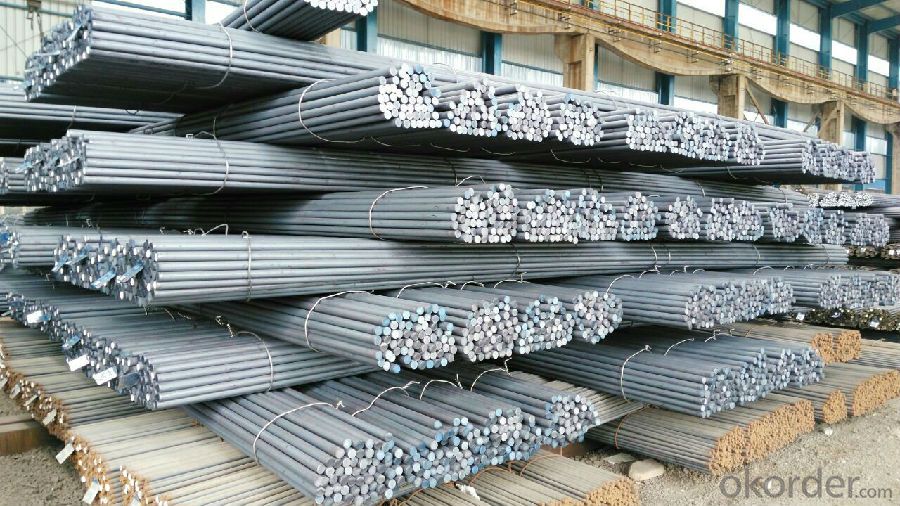
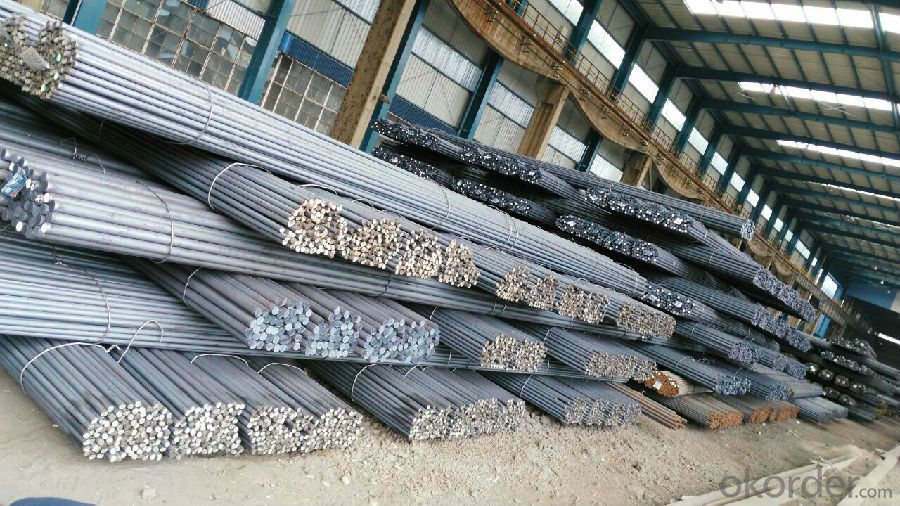
- Q: What are the applications of special steel in the aerospace sector?
- Due to its exceptional properties and capabilities, special steel finds numerous applications in the aerospace sector. Firstly, it is utilized in the manufacturing of aircraft engines. Special steel's high strength and temperature resistance make it an ideal choice for components such as turbine blades and discs, which experience extreme heat and stress during operation. Moreover, special steel provides excellent corrosion resistance, ensuring the durability and reliability of vital engine parts. Another important application of special steel in the aerospace sector involves constructing aircraft structures. Special steel alloys are employed to fabricate landing gear, wing components, and other structural elements. The high strength-to-weight ratio of special steel enables the production of lightweight yet sturdy structures, contributing to fuel efficiency and overall performance. Special steel is also essential in producing aerospace fasteners, including bolts, nuts, and screws that secure various aircraft components together. Special steel's exceptional mechanical properties, fatigue resistance, and vibration resistance make it an ideal material for fasteners, ensuring the integrity and safety of aircraft assemblies. Furthermore, special steel is utilized in aerospace tooling and equipment. Tools used in the manufacturing process, such as cutting tools and molds, are often made from special steel. Its high hardness and wear resistance enable efficient and precise machining of aerospace components. Additionally, special steel is employed in the production of specialized equipment, such as test rigs, calibration devices, and ground support equipment, which are crucial for aerospace operations and maintenance. In conclusion, special steel plays a crucial role in the aerospace sector, contributing to the overall safety, performance, and reliability of aerospace systems. Its use in aircraft engines, structures, fasteners, and tooling is indispensable for the demanding and critical applications within the aerospace industry, thanks to its unique properties.
- Q: What are the different surface finishes available for special steel?
- There are several different surface finishes available for special steel, including polished, brushed, satin, and matte finishes. Each finish offers a unique appearance and texture, allowing for customization and versatility in various applications. Additionally, special coatings such as powder coating or electroplating can be applied to enhance the surface finish and provide additional protection against corrosion or wear.
- Q: How does special steel contribute to the power generation machinery industry?
- Special steel plays a crucial role in the power generation machinery industry as it provides the necessary strength, durability, and resistance to extreme temperatures and corrosion. The use of special steel in components such as turbine blades, generator shafts, and boiler tubes enhances the overall efficiency and reliability of power generation machinery. Additionally, special steel's unique properties enable the production of more compact and lightweight equipment, leading to improved performance and reduced energy consumption.
- Q: What are the applications of special steel in the manufacturing sector?
- Special steel has a wide range of applications in the manufacturing sector, including the production of tools, machinery, automotive components, and construction materials. Its exceptional strength, durability, and resistance to corrosion make it ideal for manufacturing applications that require high performance and reliability. Furthermore, special steel can be tailored to specific requirements, enabling manufacturers to create customized products with enhanced properties, such as heat resistance or hardness. Overall, special steel plays a crucial role in various industries, contributing to the advancement and efficiency of the manufacturing sector.
- Q: What are the main factors affecting the hardness of special steel?
- The hardness of special steel is influenced by various factors. Let's explore some of the key ones: 1. Carbon content plays a vital role in determining the hardness of steel. The addition of carbon, known as a hardening element, enhances the strength and hardness. Generally, higher carbon content leads to increased hardness. 2. The presence of alloying elements like chromium, manganese, nickel, and tungsten also impacts the hardness of special steel. These elements interact with the steel, forming compounds and solid solutions that enhance hardness and strength. 3. The hardness of steel is significantly affected by the heat treatment process. This involves subjecting the steel to specific heating and cooling cycles. Quenching, a rapid cooling process, transforms the microstructure of the steel, resulting in increased hardness. On the other hand, tempering reduces hardness while improving toughness. 4. The crystal structure of the steel can also influence its hardness. For instance, during quenching, the formation of martensite, a hard and brittle structure, increases hardness. Alternatively, crystal structures like ferrite or pearlite may exhibit lower hardness. 5. The size of grains within the steel's microstructure can impact its hardness. Smaller grain sizes generally lead to higher hardness due to improved strength and limited dislocation movement within the material. 6. Work hardening, which occurs through processes like rolling or forging, can increase the hardness of steel. This phenomenon happens when dislocations in the crystal lattice become trapped and hinder further dislocation movement, resulting in increased hardness. 7. The presence of impurities or non-metallic inclusions in steel can affect its hardness. These impurities can act as stress concentrators, reducing the material's hardness. To achieve the desired hardness for specific applications, it is crucial to consider and carefully control these factors during the manufacturing process of special steel.
- Q: How does special steel contribute to the telecommunications industry?
- The telecommunications industry relies heavily on special steel, which plays a vital role by offering the necessary strength, durability, and resistance to various environmental factors. Special steel finds its primary use in the manufacturing of transmission towers, antenna systems, and other supporting structures in telecommunications. For instance, transmission towers serve as the backbone of the telecommunications network, requiring the ability to withstand extreme weather conditions like strong winds, heavy precipitation, and even earthquakes. Special steel ensures the stability and functionality of these towers under such challenging circumstances due to its high tensile strength and resistance to corrosion. Furthermore, antenna systems also benefit from the use of special steel. Whether it's for satellite communication or wireless networks, antennas require materials with excellent electrical conductivity and low signal loss. Special steel alloys meet these requirements, enabling efficient signal transmission and reception. Moreover, special steel offers the advantage of being lightweight while maintaining its strength, making it ideal for constructing structures that need to be installed at significant heights, such as telecommunication towers. By utilizing special steel, telecommunications companies can achieve cost savings in both construction and transportation. Additionally, the durability and resistance to corrosion of special steel make it ideal for long-term use in the telecommunications industry. These properties contribute to the extended lifespan of structures and equipment made from special steel, reducing maintenance and replacement costs. The longevity of special steel also enhances the overall reliability and stability of the telecommunications network. In summary, special steel's unique properties, including its strength, durability, resistance to environmental factors, and efficient signal transmission capabilities, make it an essential material in the telecommunications industry. By providing support and reliability, special steel significantly contributes to the seamless operation of communication networks, enabling efficient and reliable connectivity for individuals and businesses worldwide.
- Q: How does special steel contribute to the transportation sector?
- Special steel contributes to the transportation sector by providing high-strength and lightweight materials that enhance the performance, efficiency, and safety of vehicles. It is used in various components, such as engine parts, chassis, and suspension systems, to improve fuel economy, reduce emissions, and enhance durability. Additionally, special steel's corrosion resistance properties make it suitable for manufacturing components in harsh environments, such as marine and aerospace applications, further expanding its contribution to the transportation industry.
- Q: What are the main characteristics of corrosion-resistant steel?
- Stainless steel, also referred to as corrosion-resistant steel, possesses distinct qualities that render it highly resistant to corrosion. Below are the primary attributes of this type of steel: 1. Exceptional resistance to corrosion: An essential feature of corrosion-resistant steel is its capacity to withstand corrosion. This is achieved through the addition of specific alloying elements, namely chromium, nickel, and molybdenum, which generate a protective layer on the steel's surface. This layer, known as the passive layer, prevents the steel from coming into contact with corrosive substances, including moisture, chemicals, and acids. 2. Superb durability: Corrosion-resistant steel boasts remarkable durability, making it suitable for diverse applications in harsh environments. It can endure extreme temperatures, high humidity levels, and corrosive chemicals without deteriorating or compromising its structural integrity. This durability ensures that structures constructed from corrosion-resistant steel enjoy an extended service life, thereby reducing the need for frequent maintenance and replacements. 3. Aesthetically pleasing: In addition to its functionality, corrosion-resistant steel offers aesthetic appeal. Its smooth and polished surface bestows it with a visually pleasing appearance, rendering it a popular choice for architectural applications, interior design, and decorative elements. The ability to maintain its appearance over time, without rusting or discoloration, enhances its desirability in both industrial and residential settings. 4. High strength: Renowned for its strength and toughness, corrosion-resistant steel retains its mechanical properties even in corrosive environments. Consequently, it can withstand heavy loads, impacts, and other external forces, making it suitable for applications where structural integrity and safety are paramount. Examples include bridges, buildings, marine equipment, and automotive components. 5. Versatility: Corrosion-resistant steel exhibits versatility in terms of its applications. It can be easily fabricated, welded, machined, and formed into various shapes and sizes, thereby allowing for customization and adaptability. This versatility renders it ideal for a wide array of industries, encompassing construction, aerospace, automotive, chemical processing, and marine. 6. Hygienic properties: Another crucial characteristic of corrosion-resistant steel lies in its hygienic properties. Its non-porous surface impedes the growth of bacteria, making it suitable for applications in the food and beverage industry, healthcare facilities, and pharmaceutical manufacturing. Furthermore, its ease of cleaning and maintenance further bolsters its hygiene standards. In summary, corrosion-resistant steel seamlessly combines exceptional resistance to corrosion with durability, strength, versatility, and aesthetic appeal. These characteristics render it a dependable and cost-effective material for various industries, ensuring long-term performance and protection against the detrimental effects of corrosion.
- Q: How is special steel stored and transported?
- Special steel is stored and transported with utmost care to ensure its quality and integrity are maintained. Firstly, during storage, special steel is kept in a controlled environment with appropriate temperature and humidity levels to prevent any corrosion or damage. It is often stored in covered warehouses or storage facilities specifically designed for steel, offering protection from environmental factors such as rain, snow, and sunlight. When it comes to transportation, special steel is transported using various methods depending on the quantity and distance. For short distances, smaller quantities can be transported by trucks equipped with flatbeds or enclosed trailers. These trucks are designed to securely hold and protect the steel during transit, preventing any shifting or damage. However, for longer distances or larger quantities, special steel is often transported via rail or sea. Rail transportation ensures a smooth and stable journey, reducing the risk of damage due to vibrations or sudden movements. Steel is loaded onto specially designed railcars that provide secure storage and protection during transit. Sea transportation involves loading the steel onto shipping containers or directly onto specialized vessels. Containers are sealed and secured to prevent any movement or damage during the journey. Specialized vessels, such as roll-on/roll-off ships or heavy-lift vessels, are used for transporting oversized or extremely heavy steel components. In all cases, special steel is carefully packaged and secured using appropriate materials, such as wooden crates, steel strapping, or plastic wrapping, to prevent any scratches or dents. Additionally, the transportation process is closely monitored, and any necessary precautions are taken to ensure the steel arrives at its destination in optimal condition. Overall, the storage and transportation of special steel require meticulous planning, proper handling, and the use of specialized equipment to safeguard its quality and protect it from any potential damage or degradation.
- Q: What are the different tooling grades of special steel?
- Special steel, which possesses specific characteristics and properties, is a type of steel designed and manufactured for various industrial applications. Within this category, there are different tooling grades that have their own unique composition and properties. These grades are specifically engineered to meet the demands of different tooling applications, ensuring optimal performance and durability. There are several common tooling grades of special steel: 1. High-Speed Steel (HSS): HSS is a type of tool steel that has excellent hardness, wear resistance, and heat resistance. It is ideal for high-speed cutting tools like drills, milling cutters, and taps. Even at elevated temperatures, HSS retains its hardness, allowing it to maintain cutting performance without losing its edge. 2. Hot Work Tool Steel: This type of steel is designed to withstand high temperatures and thermal cycling in applications such as hot forging, die casting, and extrusion. It possesses good toughness, high heat resistance, and excellent wear resistance, which enable it to retain its strength and shape even under extreme thermal conditions. 3. Cold Work Tool Steel: Cold work tool steel is primarily used for cutting and forming applications at lower temperatures. It exhibits high hardness, toughness, and wear resistance, making it suitable for applications like blanking, shearing, and cold forming. Cold work tool steel maintains its hardness even under compressive forces, ensuring long-lasting performance. 4. Plastic Mold Steel: Specifically designed for the production of plastic injection molds and related tooling, this type of steel possesses excellent machinability, high polishability, and good wear resistance. It can withstand the demanding conditions encountered during plastic molding processes, ensuring precise and high-quality molding performance. 5. Powder Metallurgy (PM) Steel: PM steel is a tooling grade manufactured using a powder metallurgy process. This method allows for the production of complex shapes, uniform microstructure, and improved properties. PM steels are commonly used in high-performance cutting tools, wear-resistant parts, and high-strength applications. These examples represent just a fraction of the different tooling grades available in special steel. Each grade is carefully engineered to meet the specific requirements of various tooling applications, ensuring optimal performance, durability, and efficiency in different industrial sectors.
Send your message to us
Round Bar C60 Carbon Steel 16-300mm
- Loading Port:
- Tianjin
- Payment Terms:
- TT OR LC
- Min Order Qty:
- 25 m.t.
- Supply Capability:
- 50000 m.t./month
OKorder Service Pledge
OKorder Financial Service
Similar products
Hot products
Hot Searches
Related keywords
